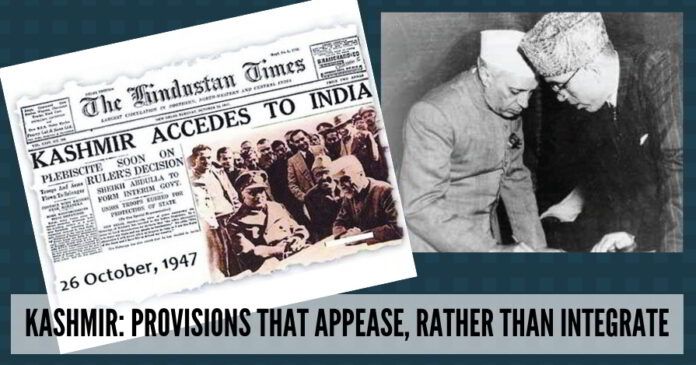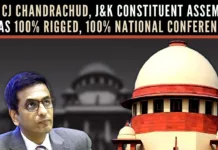
Over the decades, it has become the popular narrative that Kashmir would be lost to India if Articles 370 and 35(A), which were enacted more to appease than to integrate, were abrogated.
The debate over the continuation of Article 35(A) and Article 370 in the Constitution of India, both specifically meant for Jammu & Kashmir, has in recent days gained momentum. Those in favor of scrapping them say these provisions have become hurdles in the full integration of the State into the Union of India. Those who argue to sustain them declare that the two Articles are essential to keep Kashmir bound to the Indian Union because the case of Kashmir is ‘different’. The fact is: It wasn’t different, to begin with. The ‘difference’ was added by policymakers of that time, and over the years they propagated that abrogating them could be disastrous for India’s integrity.
Since the Instrument of Accession which was executed for Jammu & Kashmir was exactly the same as that executed in the case of other princely States which acceded in legally the same manner, then it should have led to the complete integration of that State into the Union of India, as it did in the case of the other States.
The first thing to be remembered is that the Instrument of Accession which the Maharaja of Jammu & Kashmir had sent to India on October 26, 1947, and which ‘Mountbatten of Burma’, then India’s Governor General, had accepted the following day, was in no way different from that executed by the other about 500 princely States. It was voluntary, unconditional and absolute like the rest, and worked like the rest. Its legality was above suspicion, as chronicler Alan Campbell-Johnson wrote later. But Mountbatten strangely added a twist — whether out of innocence or mischief — to the unconditionality when he wrote a ‘personal’ letter to the Maharaja thereafter. He said in that letter, after accepting the Instrument of Accession: “In consistence with their (Government’s) policy that in the case of any State where the issue of accession has been the subject of dispute, the question of accession should be decided in accordance with the wishes of the people of the State. It is my Government’s wish that, as soon as law and order have been restored in Kashmir and its soil cleared of the invader, the question of the State’s accession should be settled by a reference to the people.”
This became the seed of discontent. In itself, Mountbatten’s letter did not impact the legality of the accession, since it was not part of the Instrument of Accession, which, along with the Indian Independence Act of 1947, was the only constitutional document of relevance. But it did open a window for the critics who were opposed to Jammu & Kashmir’s accession to the then Dominion of India. They pounced upon the contents of the letter to argue that the accession was ‘conditional’. Pakistan stepped up its propaganda, with its Prime Minister Liaquat Ali Khan declaring that his country did not recognize the accession; he said: “The accession of Kashmir to India is a fraud, perpetrated on the people of Kashmir by its cowardly ruler with the aggressive help of the Indian Government.” Mountbatten’s personal letter was also to later facilitate the blunder-filled move of the Nehru regime to approach the United Nations against Pakistan’s aggression and agree to a plebiscite in the State, under Mountbatten’s advice.
The Indian Independence Act had not provided for conditional accession. It had given full powers to the rulers to accede to either India or Pakistan. Similarly, the Act had empowered the Governor-General to accept the Instrument of Accession. Mountbatten ought to have stuck to his duties and not proceeded to provide assurances beyond the constitutional scope. He not only did so but also audaciously passed off his personal opinion as “my Government’s wish”. Unfortunately, few Indian leaders objected to the terminology.
While the Instrument of Accession did not mention any conditionality that was to be met later, there also had never been any understanding between the Government of India and the Maharaja outside of the accession document to ‘ascertain’ the wishes of the people of the State. Mountbatten had, therefore, unilaterally — without taking the State’s ruler into confidence — declared that a plebiscite should be held at an appropriate time. Incidentally, the Maharaja did not signal his acceptance to the Governor General’s proposal.
To be fair, Mountbatten did respond strongly to MA Jinnah’s remark that the accession of Kashmir was based on violence. The Indian Governor-General said, “The accession had indeed been brought about by violence, but the violence came from tribesmen, for whom Pakistan, and not India, was responsible.” But the damage which his ‘personal’ letter to the Maharaja did, cannot be condoned.
Since the Instrument of Accession which was executed for Jammu & Kashmir was exactly the same as that executed in the case of other princely States which acceded in legally the same manner, then it should have led to the complete integration of that State into the Union of India, as it did in the case of the other States. And that complete integration would have, besides other things, not resulted in separate citizenship or a separate Constitution or a separate penal code for the State. There would have been no need for the likes of Article 35(A), which provides “savings for laws with respect to permanent residents and their rights”, or for Article 370 which offers exclusive provisions for the State for its “continuance with the Union”, in Sardar Vallabhbhai Patel’s words. These provisions were supposed to have had their basis in the Instrument of Accession, but that document, as we have already seen, does not place any demand, either in letter or spirit, for special consideration.
Kashmir became part of India as a consequence of the execution of the Instrument of Accession, which was unconditional. And yet, over the decades, it has become the popular narrative that Kashmir would be lost to India if Articles 370 and 35(A), which were enacted more to appease than to integrate, were abrogated.
Note:
1. The views expressed here are those of the author and do not necessarily represent or reflect the views of PGurus.











Kashmir: Provisions that appease, rather than integrate. Absolutely true.This mess has continued due to poor or no strong opposition parties in India up to 1985 and Abdullah-Nehru-Gandhi dynasties took us for a ride and drilled into our heads that Kashmir is a disputed province. Adding salt to injury Nehru did unpardonable blunders.Secularism destroyed entire India and left people without any patriotism towards their mother land and caste politics were in full glare and two leaders planned assassinations thereby continued dynasty rule further.
One should understand that KASHMIR issue was “non-existent before” independence!!
Pakistan was carved out of big subcontinental indian landmass.
Nothing is going to happen if 370 is abrogated and 35A will automatically go out of the window.
Having ruled Gujarat State for 13 years, PM Modi did not have experience in running central government and took all rotten system on his shoulders alone instead of sharing it with better experienced few leaders available in his own party hence he is facing “delays” in all that he does.